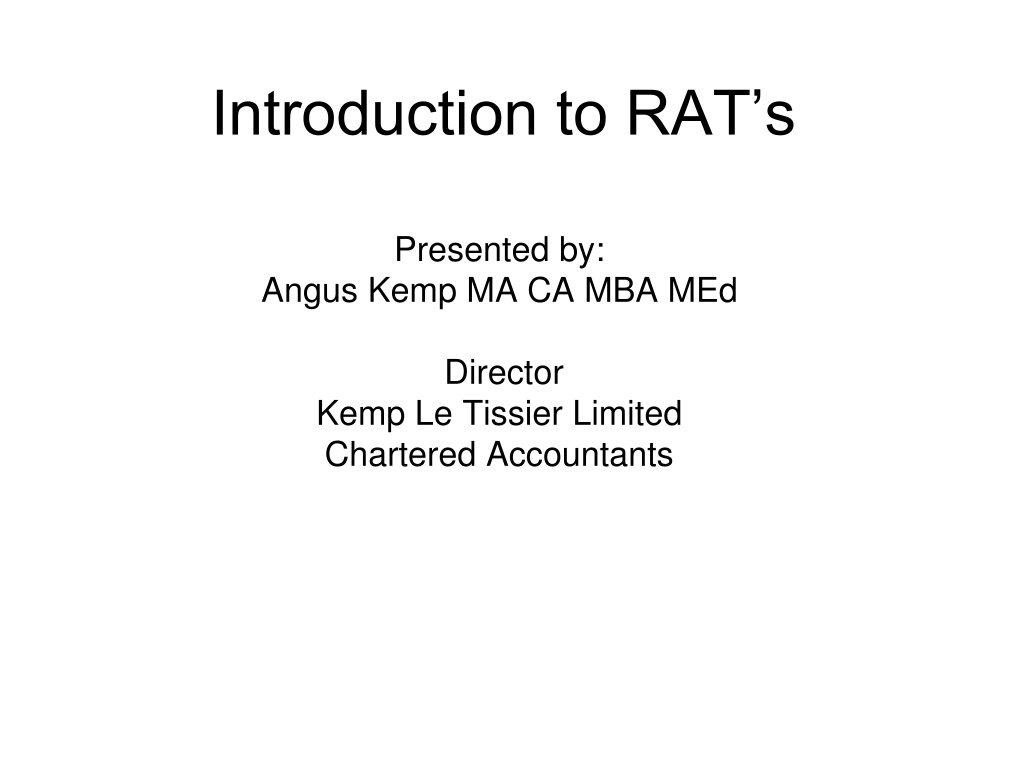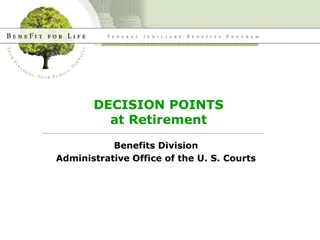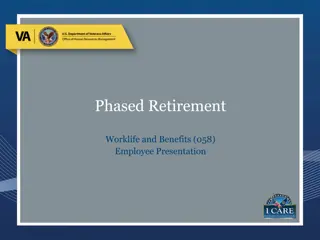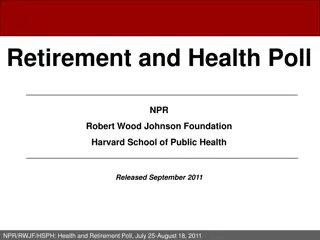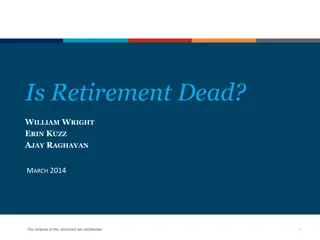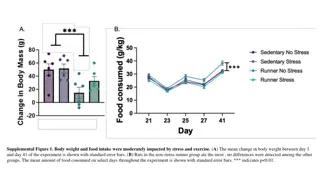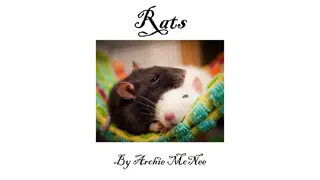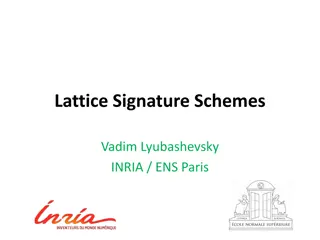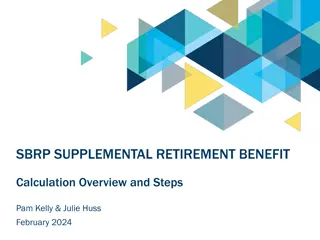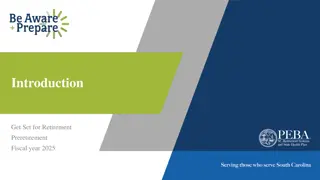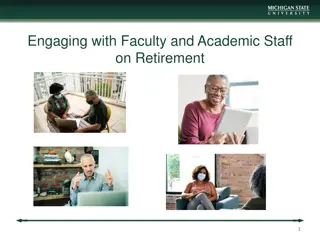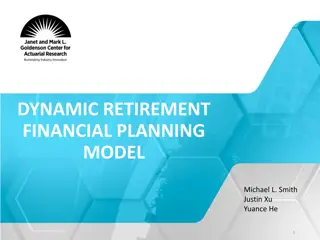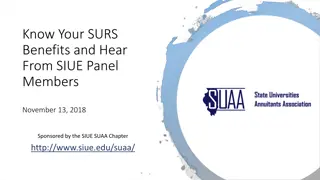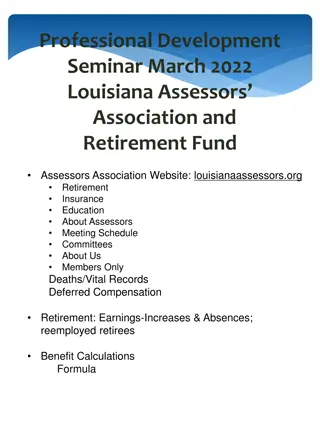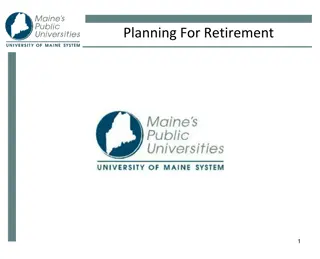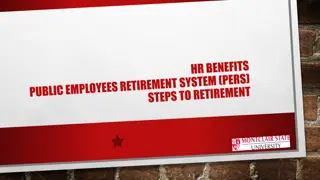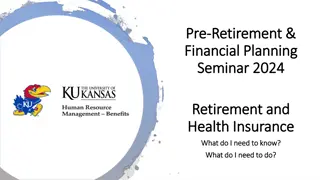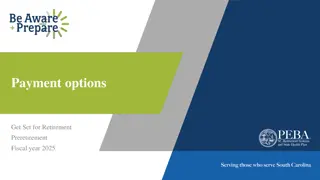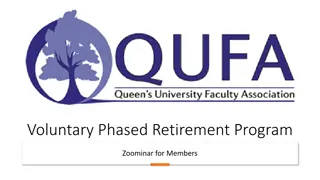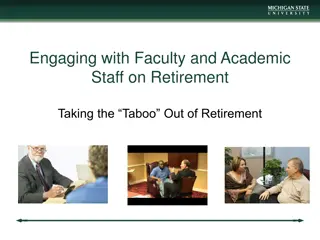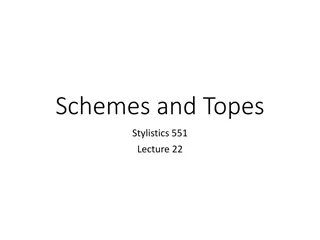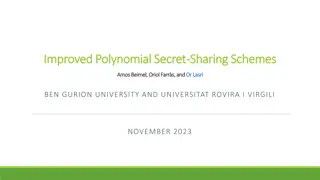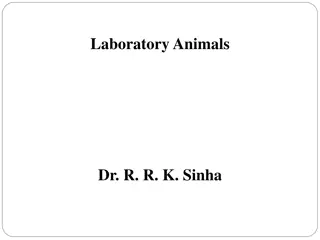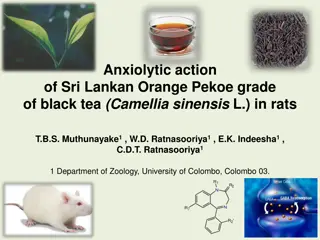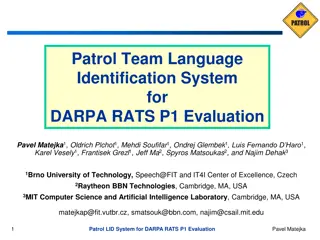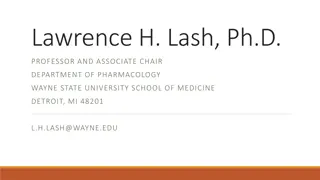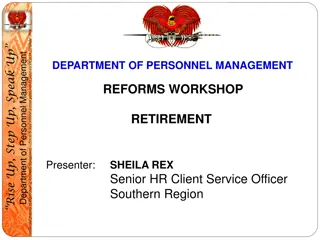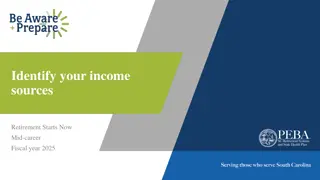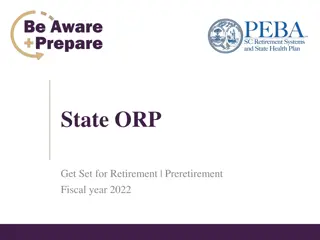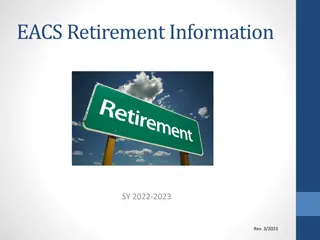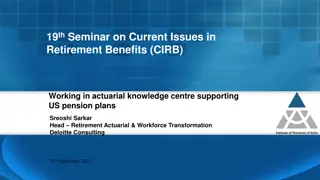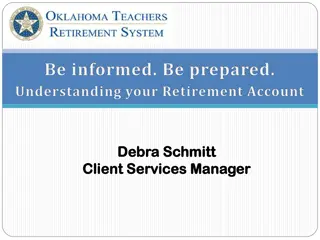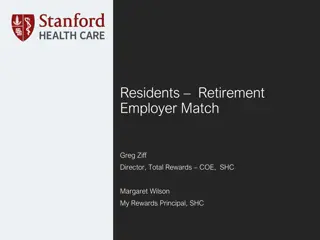Understanding Retirement Annuity Trust Schemes (RATS)
This presentation introduces Retirement Annuity Trust Schemes (RATS) as a self-administered private pension scheme, discussing their benefits, scheme approval, duties of trustees, investments, taxation, and more. It highlights the challenges of the pensions crisis due to demographic changes and offers insights into how RATS can serve as flexible pension vehicles for residents of Guernsey.
Uploaded on Sep 28, 2024 | 0 Views
Download Presentation

Please find below an Image/Link to download the presentation.
The content on the website is provided AS IS for your information and personal use only. It may not be sold, licensed, or shared on other websites without obtaining consent from the author. Download presentation by click this link. If you encounter any issues during the download, it is possible that the publisher has removed the file from their server.
E N D
Presentation Transcript
Introduction to RATs Presented by: Angus Kemp MA CA MBA MEd Director Kemp Le Tissier Limited Chartered Accountants
Course outline What is a RAT? Why use a RAT? Who can benefit? Scheme Approval Code of Practice Duties and Responsibilities of Trustees Investment Loans from the RAT Annual Accounts Taxation Issues
Background In 1991 amendments to the Income Tax (Guernsey) Law 1975 introduced s.157(A)(4). These amendments allowed for the approval of Retirement Annuity Trust Schemes (RATS). A RAT is a form of self-administered private pension scheme.
Retirement When you leave your job and stop working, usually because you are old. Freesearch online dictionary
Annuity A fixed amount of money paid to someone every year, usually until their death. Freesearch online dictionary
Trust A legal arrangement in which a person or organisation controls property and / or money for the benefit of another person or organisation. Freesearch online dictionary
The Pensions Crisis Caused by a demographic timebomb. There is an ageing population. As we are living longer we need more to live on in retirement. Today, retirement can last for 20 year or more. You could have a retirement half as long as your working life. This has made pensions more expensive. In simple terms, more needs to be invested to provide a sufficient income in retirement.
The Pensions Crisis (2) Falling stock markets have hit the value of pensions. Many employers schemes are in deficit. Low interest rates have reduced the value of pensions that can be bought on retirement. You cannot rely on the States to provide a decent pension in retirement. They have many priorities and pensions is not top of their list. Because the states pension tends to keep pace with inflation not earnings, it tends to fall in real terms.
RAT A Discretionary Trust which acts as a personal pension scheme for individuals who are resident in Guernsey. RAT s are highly flexible pension vehicles which are approved by the UK and Guernsey tax authorities. A pension must be drawn between the member s 50thand 75thbirthdays.
Approval - Scheme The Income Tax (Guernsey) Law 1975, at section 157A(4), allows for the approval of a RAT provided that it is established: (a) under the laws of the UK or Guernsey and is administered in either of those territories; and (b) for the purposes of providing Retirement Annuities for individuals and their families and dependants; (c) under irrevocable trusts
Approval - Member To be eligible to join an approved RATS, an individual must be resident in Guernsey and the Administrator will, in the case of a new resident, wish to be satisfied that he has taken sufficient steps to indicate this intention. Some people will wish to effect a RAT before their residence status has been finalised. The Administrator of Income Tax will accept the purchase of property or the renting of premises on a long lease as sufficient evidence of intent, but will not accept an accommodation address or hotel rooms.
Trustees At all times there should be at least two Guernsey resident Trustees; Except that where a corporate Trustee is appointed, this condition may be waived, so long as it is Guernsey resident. Members of RAT Schemes may not be trustees of the scheme, nor may any relative of the member or his spouse. This may be waived if the Trust Deed enables the Trustees to act by majority and the majority of those trustees are neither members of the Scheme nor relatives. Any changes to the trustees must be notified to the Administrator within 30 days.
Code of Practice Mandatory for all Trustees Compliance with the Code is a condition of approval under Section 157A of the Income Tax (Guernsey) Law, 1975.
The Trustees Role Independent Trustee Number of Trustees General Duties Trustees should ensure that they have read the relevant sections of the Trusts (Guernsey) Law, 1989 and understand their responsibilities
Annuity If the annuity to be provided is not to be purchased from an insurance company, then a quotation should be obtained either from an actuary or from a recognised insurance company. The annuity may allow for no increases, for annual increases up to a fixed rate of 5% per annum or in line with the Guernsey RPI. The annuity must be paid in accordance with the quotation selected. The terms and conditions of annuity payments may be reviewed at intervals of not less than three years. At the outset and at any review, details must be lodged with the Income Tax Office. When the annuity commences the Trustees will be responsible for operating the ETI Scheme on the payments.
External Advisors In acting as an advisor, practitioners should have regard to the following points: If the RAT is set up as a result of a transfer value being paid out of an occupational pension scheme or a personal pension, then the annuitant must sign an undertaking to be lodged with the Income Tax Office, to indicate that he understands what he is giving up, including the nature of guarantees and bonuses given up.
External Advisors (2) The RAT must be of an appropriate size to be cost effective in relation to administration costs, intermediary costs, investment management costs and any other advisory costs. The investment selected for the RAT should have regard to the cash flow requirements needed to make the annuity payments. Where the advisor will receive remuneration from the provider of investment services in connection with the RAT Scheme, this should be disclosed to the Trustees.
Trustees Duties Primary: Hold assets for the benefit of the Beneficiaries Act in accordance with the Trust Instrument Act in accordance with the proper law of the Trust Fiduciary duty to act in the best interests of the Beneficiaries High standard of care
Duties upon taking office Ensure transfer of property Acquaint yourself with the trust assets Investigate proceedings of previous trustees to ensure no breach of Trust Confirm inventory of assets Ensure all assets are in Trust s possession
Ongoing Duties Keep accounts Have accounts audited annually if required Keep permanent and working files Keep a record of all payments made to the Beneficiaries
Duties of Investment Look after Trust Fund Preserve and enhance the Fund within reason No speculative investments Observe any limitations in the Trust Deed
Other Duties Duty to provide information Only distribute to persons entitled Not to profit personally To follow the Trust Deed Keep accounts To give information where required To keep Trust Property separate from own property Act impartially
Transfers Prior approval is required for all inward transfer payments where the individual in respect of whom the transfer is to be made has not been resident in Guernsey for income tax purposes for at least two years of charge prior to that in which the transfer is to be made.
Transfers (2) Before approval is given, evidence may be required to show that the payment has been approved by the relevant authority in the transferor s territory. Outward transfer payments may be made, provided they are allowed by section 157C of the Income Tax (Guernsey) Law 1975, and tax should be deducted and remitted to the Income Tax Office.
Pre Retirement Investment Don t be recklessly cautious: If you avoid all capital risk, you increase the risk of not being able to meet your investment targets. You also increase the risk that your investments might not grow enough to beat inflation. Don t put all your eggs in one basket: Have a spread of different types of investment eg some equities, some property, some bonds and some cash
Match the risks to the circumstances You can afford to take more risks with the pension fund when the beneficiary is younger: You can ride out a slump in share prices because you have a long time to go until you need to convert your pension fund into income. If you do make losses, you still have many earnings years left which gives you a chance to recoup your losses. As you get older you should generally reduce your exposure to risk
Lock in your gains as retirement approaches Protect yourself from a share slump just as you need to cash in your investments to buy a pension. Do this by shifting your fund away from equities and into bonds and cash over, say, the ten year run-up to starting your pension.
Post Retirement Investment Remember your pension pot might have to last a long time You can take 30% of your pot tax free You need to comply with the Income Tax Office rules Don t expect the State to bale you out You can leave any unutilised portion of your fund to your heirs (less 20% tax).
Loans Loans to members may be made by the Trustees provided that: The total advance at any time does not exceed 30% of the fund value. Interest is charged on a commercial basis. Such interest must be paid at least annually. The Trustees should ensure that they hold sufficient security for the loan to enable them to enforce repayment at any time. The loan must be repaid before benefits commence to be paid in respect of the member for whom the loan was made.
Annual Accounts Annual accounts should be prepared. There is no prescribed format but these normally contain: Scheme details Income Account Capital Account Balance Sheet Notes to the Accounts
Benefits A member must start to draw an annuity between his 50thand 75thbirthday but there is no requirement that an annuity must be purchased from an insurance company. A tax free lump sum of up to a maximum of 30% of the fund can be taken at the time the annuity is drawn down. This is capped at 198,000 for 2019. On the death of the member the funds do not revert to an insurance company (unless the annuity is purchased from an insurance company) but are available for distribution subject to a tax charge of 20%.
Benefits (2) A member is not required to contribute to a scheme but may do so. Contributions in any one year of up to the lower of 100% of taxable income or 35,000 (2011 2017 limit was 50,000) will be allowable as a deduction for tax purposes. The Law does not prohibit the payment of members contributions in excess of this amount but no tax relief will be granted for contributions in any one year in excess of these amounts. The monetary limit of 35,000 has been established for 2019 and may be reviewed for subsequent years. Where contributions have been made into private schemes in the past but maximum contributions have not been made in any particular year, the spare capacity can be carried forward for up to 6 years to facilitate increased contributions in a later year.
Typical Trust Deed - Contents Effective date Interpretation Appointment, Resignation and Removal of Trustees Administration of the Scheme Proceedings of the Trustees Appointment of Auditor and Scheme Accounts Appointment of Actuary Cost of Scheme, Contributions and Expenses Appointment of Investment Manager
Typical Trust Deed Contents (2) Powers of Investment Powers to Borrow and Accept Donations Trustees Entitlements Power of Amendment Effect of Amendment General Powers of Trustees Liability to Trustees Proper Law
